-
Public comment on EPA’s new rules for hazardous air
The exhaust from the boilers of industrial and commercial buildings, and incinerators can be particularly poisonous; consistent inhalation can lead to heart and lung disease and cancer.
-
Mayor Bloomberg Signs Heating Oil Bill into Law
This afternoon, Policy Integrity legal fellow, Jason Schwartz spoke at the bill signing ceremony for Introduction 194|Text|&Search=194, a New York City Council act that will reduce air pollution.
-
Why is the government skewing the economic analysis for coal ash regulation?
Recently, the EPA released an unofficial, pre-publication copy of a regulation designed to address coal ash, the toxic leftovers of the coal-combustion process.
-
Policy Integrity Testifies at NY City Council Hearing on Clean Heating Oil
Policy Integrity legal fellow, Jason Schwartz, testified this afternoon at a hearing on a bill that would restrict the use of the dirtiest fuels used to heat some New York City apartments.
-
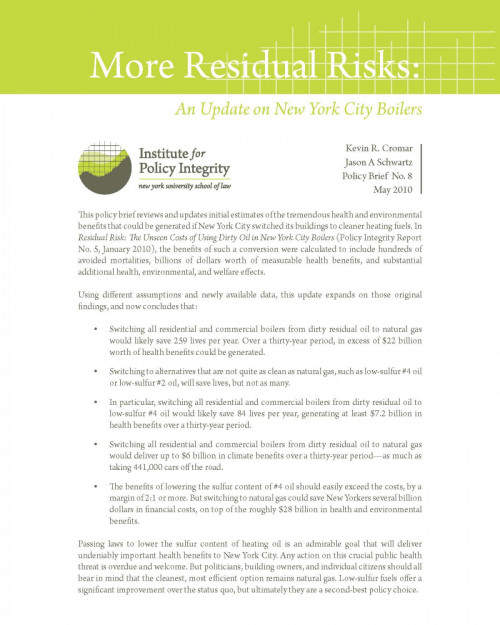
More Residual Risks
An Update on New York City Boilers
Up to 259 lives could be saved every year if certain large buildings in New York City stopped burning dirty heating oil. Using newly available data, a reworked analysis finds that residual oil has even greater consequences than estimated in an earlier report.
-
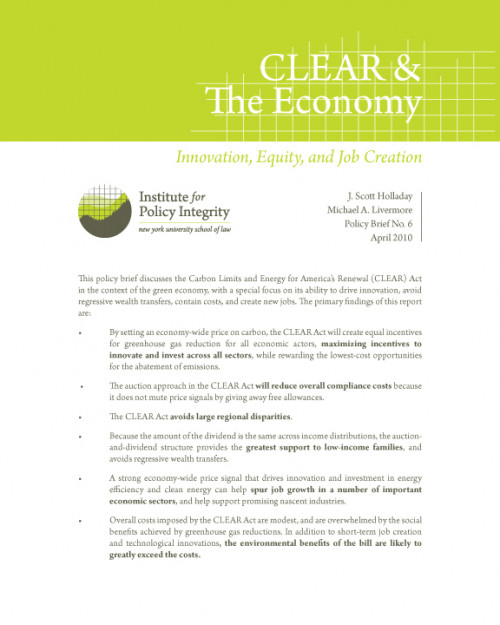
CLEAR & The Economy
Innovation, Equity, and Job Creation
The CLEAR Act, sponsored in the Senate by Maria Cantwell (D-WA) and Susan Collins (R-ME), would place a price on carbon, auction 100% of the pollution permits, and refund most of the revenue back to consumers. This brief found that pricing carbon would spur investment and innovation in new energy technologies, giving a substantial boost to industries like manufacturing and construction—both hit hard in the recent financial crisis. Relatively well-paying jobs would be generated in these sectors, helping to mop up the slack created by the recession.
-
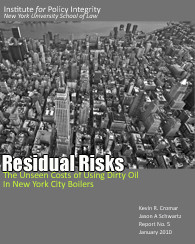
Residual Risks
The Unseen Costs of Using Dirty Oil in New York City Boilers
In about 9,000 big apartment and commercial buildings in Manhattan, Brooklyn, Queens, and the Bronx, boilers burn a dirty fuel to heat their units. “Residual Risks” analyses the health, environmental, and economic benefits of switching away from this dirty fuel to cleaner alternatives like natural gas.
-
Research in support of heating oil regulations
For the last year, New York City has been working to develop potential regulation of the dirtiest heating oils used in residential and commercial boilers. Policy Integrity has been in close contact with city officials and interested advocacy groups as the rule is being developed to help quantify the potential health benefits and shape a rational regulatory response.
-
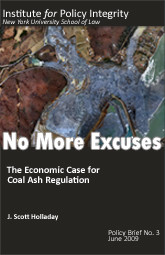
No More Excuses
The Economic Case for Coal Ash Regulation
No More Excuses: The Economic Case for Coal Ash Regulation is a brief but careful analysis which reveals several compelling findings on the regulation of the toxic by-product of coal combustion. In broad strokes, it is clear that the benefits of regulating coal ash storage facilities would far outweigh the costs. The benefits of a regulation requiring coal ash to be stored in dry conditions and in synthetically-lined, covered facilities could save tens or even hundreds of millions of dollars per storage facility.
-
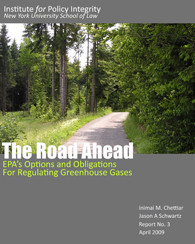
The Road Ahead
EPA’s Options and Obligations for Regulating Greenhouse Gases
This detailed legal analysis provides an in-depth and thorough discussion of greenhouse gas regulation under the Clean Air Act answering the questions: What are EPA’s obligations under the Clean Air Act, and how far can and should the agency go to regulate greenhouse gases?
Viewing recent projects in Environmental Health
